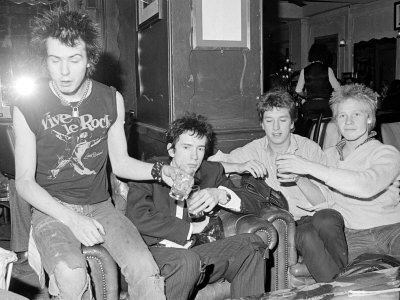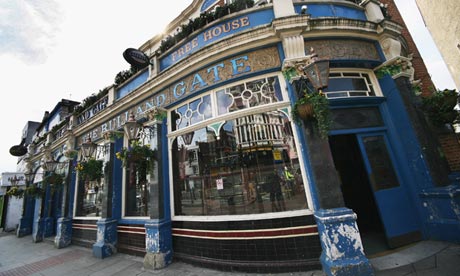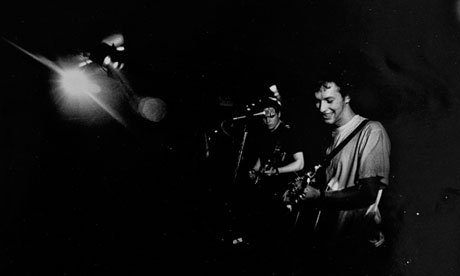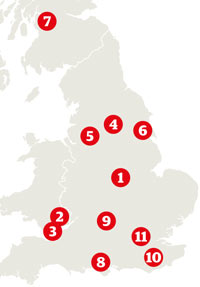Can the UK’s ‘toilet circuit’ of small music venues survive?
From Punk Rock,Ian Dury, The Police, U2, Madness, Coldplay to PJ Harvey, Amy Winehouse, and countless other big British rock acts started out playing tiny pubs and clubs around the UK. But with many of these venues closing, who will keep the rock’n’roll dream alive?
Will another coffee shop bring in £ billions, tourists, radio play and record sales worldwide, that so many British bands have done for the UK. Small pub curcuit is the first step to a carreer, and artform, that british people hold so dearly to their hearts. The Government war on pubs and alcahol consumption will have its casualties, and British music is suffering severely. Every person that comes to the UK to see a band will bring on average around £500 to the British economy. The translates to £millions every year. Bands didnt start their career, at Wembley arena. Are we going to hand over the entire music industry to 5 minute kareoke singers and make Simon Cowell a bit richer


The Bull and Gate in Kentish Town in north London. Its closure is partly due to the city’s music scene migrating eastward. Outside the capital, things are even tougher. Photograph: Dan Kitwood/Getty Images
The Bull and Gate in Kentish Town in north London is, in music-business vernacular, a “toilet venue”, where the stage can just about accommodate a four-piece band, and the dressing room contains a solitary grubby mirror. But the term does this place a real disservice, both in terms of the ornate Victorian splendour of the main bar, and in the roll call of names who have played in the 150-capacity back room – among them, Madness, The Clash Coldplay, Pulp, PJ Harvey, Muse, Blur and the Manic Street Preachers.
After three decades of hosting gigs here, the landlord and landlady are selling up and retiring. The Bull and Gate has been bought by the brewery and pub company Young’s, who are apparently set on turning it into a gastropub (“We don’t feel that having a live music offering at the pub alongside our plans to serve food is viable,” went one company statement). The venue’s current music promoters, a four-person outfit called Club Fandango, will stage their last show on 4 May, which will be preceded by a special run of gigs, likely to feature notable alumni of the Bull and Gate, to be titled Play Your Respects. And that will be that: yet another small music venue shutting its doors, adding to a list of closures that extends across the country, and threatens one of British popular culture’s most inspired inventions: the so-called “toilet circuit”, on which no end of hugely successful musicians have taken their first decisive steps.
In London, as with most matters reducible to hard cash, things are not as bad as elsewhere: here, the story is partly about decline, but also a migration of venues to the east of the city, as ongoing gentrification pushes live music out of its old north London stamping grounds. But beyond the M25, things look grim. The national Barfly chain, which had venues in Brighton, Birmingham, Cambridge and Cardiff, closed most of them between 2008 and 2010. Such famous places as Leeds’s Duchess of York, Newport’s TJs and Leicester’s Princess Charlotte have either been converted to new uses or left to fall into disrepair.
Others are surviving, but struggling: the people in charge of the renowned Hull Adelphi have expressed serious doubts about its future, and venues such as the Tunbridge Wells Forum are now staffed by volunteers. Four or five years ago, the music business clung to the idea that even if sales of CDs were being squeezed, people’s appetite for ticketed live events looked to be increasing. That may hold true for bigger venues, but at the bottom of the live hierarchy, a new rule seems to hold sway: if people now expect to get their music for nothing, they increasingly think that the same ought to apply to watching new bands, no matter how promising they might be.
Twenty or so years ago, when I was a young music writer, I spent most of my evenings in these places, keeping myself going on lager and cigarettes, watching endless bands and occasionally finding music worth evangelising about. It’s a life I still miss, when I used to keep the company of some of the people whose drive and enthusiasm still keep the milieu around small venues alive today – people such as Simon Williams, the one-time staff writer at the New Musical Express who went on to found esteemed independent record label Fierce Panda, before also extending his activities into gig promotion and eventually rooting Club Fandango at the Bull and Gate.
Sitting in an alcove in the pub’s main room, Williams and his business partner Andy Macleod briefly rhapsodise about triumphant Bull and Gate moments (when Coldplay played here in April 1999, says Williams, the queue extended down Kentish Town Road, and they were “just too good”). They also talk me through the events of the last few years: their attempts to buy the Bull and Gate to use as a venue and company HQ, and a quest to secure sponsorship which included a pitch to the makers of an iconic energy drink built on the rebranding of the place as the Red Bull and Gate: “We said to them, ‘You can just paint it, like you do with Formula 1 cars – it’s the greatest tag-line of all time.'”
They have now found a new venue in Dalston, but the imminent closure of the Bull and Gate evidently still hurts. “It’ll be appalling when it actually goes,” says Williams. “I’ve been coming here since 1986, when I was doing a fanzine. That’s a long time. We’re absurdly romantic about this place, and absurdly loyal.”
“Once it becomes a gastropub, that’s final, isn’t it?” says Macleod. “That 33 years of musical heritage just disappears. It’ll all feel really sad.”

Coldplay on stage at the Bull and Gate in London in April 1999, the night they signed their record deal. Photograph: Sarah Lee for the GuardianThe squeeze affecting small venues, they tell me, is down to a tangle of factors: among them, the transformation of urban neighbourhoods such as Kentish Town, the rise of free gigs where the band get a cut of the bar takings, and a music industry that now gets involved with up-and-coming acts at an absurdly early stage. “There’s no money in new bands, we all know that,” says Williams. “But now, with the hyper-speed of things in the music industry, you get in touch with a band who might be doing their first gig, and it’ll be, ‘Talk to our manager, who’s got to talk to the lawyer and the agent.'”
Purely to be seen to be doing their job, they tell me, a band’s representatives might now demand a guaranteed fee of anything up to £75. When the costs of a night at the Bull & Gate come in at least £200 before any musicians have been paid, that threatens the whole viability of the enterprise, not least when every promoter fears the turnout music industry lore knows as “two men and a dog”.
Tonight’s bands draw a combined crowd of around 40. First on are an unremarkable-looking quartet called Civil Love, who play a surprisingly accomplished version of the melodic genre some call power-pop. Next are Evil Alien, a part-electronic band from Birmingham who have driven down to play their first London show, pulling in talent scouts from record companies and a smattering of curious booking agents. Last, bless them, are a White Stripes-esque duo called I Like the GoGo, who send me running from the room with their somewhat irreverent treatment of the Dexys Midnight Runners’ song Geno.
Back at the bar, I talk to the Bull and Gate’s landlord, 70-year-old Pat Lynskey, who speaks with the wry detachment of a man who has seen a few generations of musicians and drinkers come and go, and will soon be spending his first summer in over three decades well away from beer taps and time bells. “I think in the last five years, technology has not been good to us,” he says. “Prior to that, people had to come and see what was on, and they’d stay for the night. Now, they can check everything on their phone before they leave. And if they don’t like it, they won’t come.”
History records that the Manic Street Preachers played at the Bull and Gate on 17 October 1990, when they had just put out an almost-ignored record titled New Art Riot, and were trying desperately to get the attention of the weekly music papers, and again on 17 July of the same year, in even less auspicious circumstances.
“We were on after this really weird folk band, who were Russian or Ukrainian, I think,” says their bass player and lyric writer Nicky Wire. “We walked on stage, and the first thing I said was, ‘Fuck me – no wonder so many Russians kill themselves’, to a very bemused audience. We did about five or six songs. It was a bit of a thrill to play there, because it was always on [1980s and 90s TV staples] Rapido and Snub TV. It did feel like a really good gig to do.”
He recalls the shabbiness of the kind of places the Manics once played, but also the romance they embodied. “There was definitely a ragged glory to it. You felt you were treading the boards of heroes, because nearly everyone we loved had done the same thing.” He mentions vividly remembered gigs at the Leeds Duchess of York, the long-gone Buzz Club in Aldershot, and Southampton Joiners, where the boss of the Columbia record label paid the band a visit, and their career-securing contract was thereby confirmed.
The 200-capacity Joiners is now battling to survive, which leads me to pay a visit the night after my trip to Kentish Town. Having never been there before, I’m thrilled to find a toilet venue par excellence: a bar whose furnishings extend to two apparently paleolithic sofas, a disused subterranean dressing room – flood-damaged, it seems – covered in graffiti left by visiting musicians (“Razorlight – I want to torture you slowly and let you die in a lot of pain”), and an abiding sense of everything being held together by simple goodwill.
“The chances of us closing are massive,” says the venue’s manager, the imposing but genial Patrick Muldowney. “Every Monday morning, we see what bills we can pay – and some weeks, we don’t have enough money, simple as that.” Recent benefit concerts by the Vaccines (toilet circuit graduates who will soon play the 20,000-capacity O2 arena in London) and the singer-songwriter Frank Turner have brought in much-needed funds. But times are unendingly tough: whereas he could once depend on even local bands drawing in at least 30 paying customers, Muldowney says the figure is now closer to 10. “It’s a two-thirds drop-off,” he says, with a grimace. “So it’s massive.”
As in London, Southampton now sees regular free gigs in standard-issue bars and pubs that are financed by sales of drinks, something made easier by a recent legislative change that got rid of any need for an official music license for venues that hold up to 200 people. For the Joiners, that kind of event is pretty much impossible: it has an over-14 license for its music room (an integral part, says Muldowney, of its ethos), and a much more thrifty culture. “The difference between us and a pub is that 50% of our crowd won’t buy a drink all evening,” he says; the Joiners’ head band booker, Ricky Bates, also points out that whereas lesser venues will offer little better than a “karaoke PA”, the Joiners prides itself on an estimable sound system, but it needs a paid engineer to work it.
Tonight’s headliners are the History of Apple Pie, who play indie-rock built on a mixture of sweetness and noise, and are at the end of a 19-date tour punctuated by nights spent at Travelodges and the odd recuperative stay at parents’ houses scattered around the country. Before them, I watch a local trio called Imperatrix, who are bedevilled by colds and flu, and by the fact that their drummer learned their songs a mere 12 hours before. They deliver a performance full of very familiar ingredients: brief flashes of promise, gauche repartee and the sense that with enough visits to venues like this, they might just discover who they actually are.
On my way out, I’m given a Joiners T-shirt, covered in an A-to-Z of the bands who have played here – from the Arctic Monkeys to the Zutons. Next to the door is a list of forthcoming attractions, featuring names that instantly convey the mixture of bravado and creativity that often courses around places like this: the Dead Lay Waiting, Our Lost Infantry, Burglars of the Heart. And a potent thought once again hits home: what a profound pity it would be if the toilet circuit was allowed to rot away – leaving endless free music and ad hoc gigs, but no dependable means via which musicians can been transported away from their home turf, towards something bigger.
“It gets under your skin, doesn’t it?” says Muldowney, by way of a goodbye. “You fall in love with places like this.” Counting in a steady stream of people at the door, he looks firmly in his element, though he views the future with an uneasy mixture of hope and uncertainty. “I’m an eternal optimist,” he says. “We’ll certainly be here in a year.”
UK toilet circuit landmarks past and present

1 Leicester Charlotte (formerly Princess Charlotte; capacity: 200)
Hosted Oasis, the Libertines, Muse et al, but closed in March 2010, to be developed into student flats.
2 Newport TJs (capacity: 350)
A legendary venue where, in December 1991, Kurt Cobain is said to have proposed to Courtney Love. Closed in 2010, and has fallen into disrepair.
3 Cardiff Barfly (capacity: 200)
Part of a chain of small venues that hit the buffers between 2008 and 2010. Hosted future US stars Kings of Leon on their first UK tour.
4 Leeds Duchess of York (capacity: 200 officially, 300 on a good night)
Put on gigs in its cramped back room by such future stars as Nirvana, Coldplay and Pulp. Now a branch of menswear giant Hugo Boss.
5 Manchester Roadhouse (capacity: 200)
Still in business. The entire membership of future Mercury Prize-winners Elbow have worked here; singer Guy Garvey was once the barman.
6 Hull Adelphi (capacity: 200)
In a former housing terrace. Has struggled to survive, but will, with luck, celebrate its 30th anniversary in 2014.
7 Glasgow King Tut’s Wah Wah Hut (capacity: 300)
A survivor, and one-time platform for such future stars as Florence and the Machine and the Killers. Famously where Creation records boss Alan McGee first saw Oasis in May 1993.
8 Southampton Joiners (capacity: 150)
Now fighting the prospect of closure; current indie stars the Vaccines recently played a benefit show. Local legend claims that Jimi Hendrix played here en route to the Isle of Wight festival in 1970.
9 Oxford Jericho Tavern (capacity: 180)
A heartwarming story: after a spell as part of the student-oriented pub chain Scream, reopened as a music venue in 2005. It was once a home from home for Radiohead.
10 Tunbridge Wells Forum (capacity: 250)
The toilet venue that was once a (public) toilet. Still in business, 20 years old, and staffed by volunteers.
11 London Kentish Town Bull & Gate (capacity: 150)
One of the most renowned toilet venues, and now set for closure. Has hosted Madness, Blur, Manic Street Preachers, Muse, Coldplay and hundreds more. Set to become – why, of course – a gastropub.

